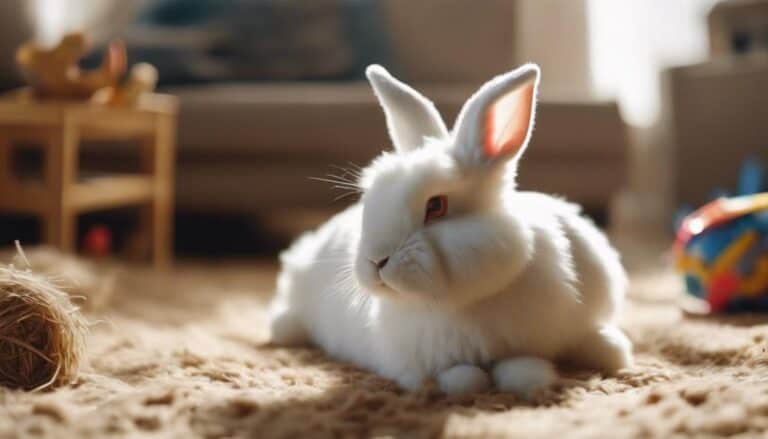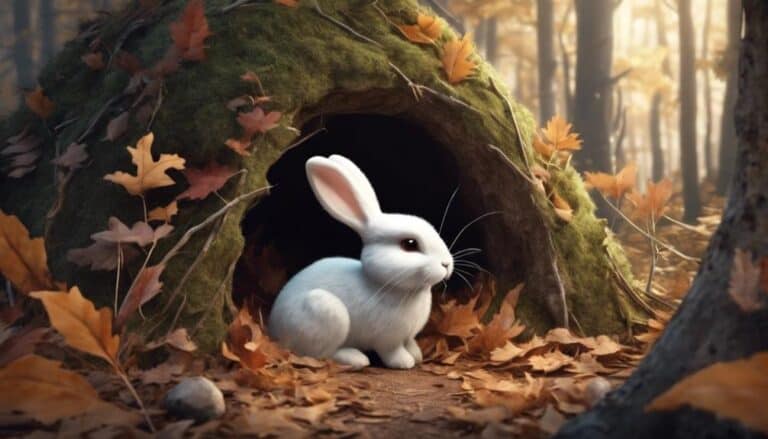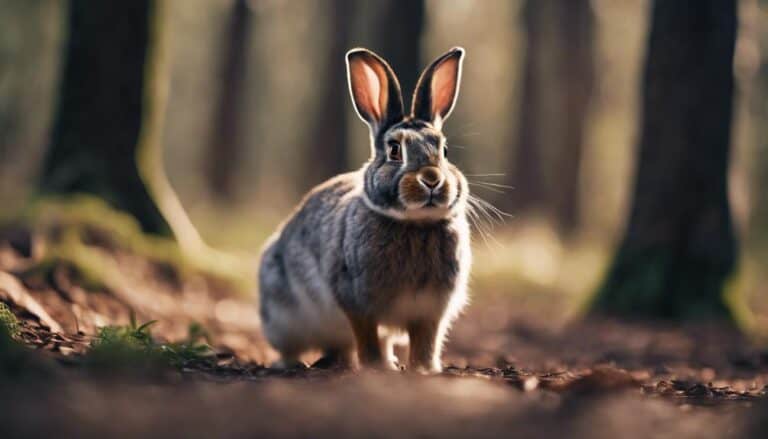Rabbits are pretty awesome for the environment. They help out by munching on weeds, which keeps them in check. Plus, their droppings add nutrients to the soil and make it richer.
When rabbits dig their burrows, they help air get into the soil and make it better for plants to grow. These burrows also give insects a place to hang out.
And here's a neat thing – rabbits being prey help keep the balance by making sure there aren't too many predators around. By nibbling on plants, they make room for new ones to grow, which keeps everything in harmony.
This all helps create a good environment for different creatures to thrive in and keeps the ecosystem healthy and strong.
Contents
- 1 Key Takeaways
- 2 Ecological Impact of Rabbit Grazing
- 3 Rabbit Burrowing and Soil Health
- 4 Role of Rabbits in Promoting Biodiversity
- 5 Rabbit Population Control in Ecosystems
- 6 Rabbit Habitats and Ecosystem Balance
- 7 Rabbit Contributions to Plant Diversity
- 8 Importance of Rabbits for Environmental Well-Being
- 9 Frequently Asked Questions
- 10 Conclusion
Key Takeaways
Rabbits help the environment in several ways. For starters, when they munch on fast-growing weeds, they help control those pesky plants and make room for a greater variety of vegetation to thrive. Their burrowing also plays a part by aerating the soil and helping nutrients move around more easily.
Plus, rabbit droppings are like natural fertilizer for the soil, giving it a boost and supporting a diverse range of plant species. And here's an interesting twist – rabbits serve as prey for other animals, which helps keep predator populations in check and maintain a balance in the ecosystem.
When you put it all together, rabbits really do their part to keep the environment in good shape. They contribute to the overall health of ecosystems, help maintain balance, and support biodiversity. So, next time you see a rabbit hopping around, just remember all the ways they're quietly working to keep things in harmony.
Ecological Impact of Rabbit Grazing

Rabbits munching on plants actually help keep things in check in the ecosystem. They chow down on fast-growing weeds and leave behind droppings that are full of nutrients, which help make the soil healthier. By grazing, rabbits prevent certain plants from taking over while also encouraging the growth of different types of plants. This variety of plants is good for the ecosystem because it stops one type from dominating and creates a better environment for all kinds of creatures.
Plus, rabbits are an important part of the food chain. They become meals for many predators, which helps keep the predator populations in check. This balance is crucial for maintaining a diverse range of species and preventing any one species from becoming too numerous.
However, if non-native rabbits start invading, it can cause some problems. These invaders might outcompete the local species for resources, which can lead to soil erosion and disrupt the natural cycling of nutrients. It's important to manage rabbit populations carefully to avoid these negative effects and keep the ecosystem healthy overall.
Rabbit Burrowing and Soil Health
Rabbits digging holes in the ground actually help make the soil healthier. When rabbits burrow, they create more space in the soil for air, water, and nutrients to move around. This makes it easier for plants to grow roots and for water to soak into the ground. The extra air in the soil also helps tiny organisms and plant roots by giving them oxygen and stopping the soil from getting too compact.
Not only that, but when rabbits dig, they mix in organic matter from the surface into the soil. This helps to feed the microorganisms in the soil, which in turn provide nutrients for plants to grow. So, their digging helps to recycle nutrients and keep the soil rich for plants to thrive.
Rabbit burrows also make cozy homes for other creatures like insects and small animals. This helps to create more diversity in the ecosystem. The disturbances caused by rabbits can even help new plants to sprout and grow, as they loosen up the soil and make it easier for seeds to take root. So, rabbits are like little soil engineers that play a big role in keeping the ecosystem healthy and balanced.
Role of Rabbits in Promoting Biodiversity
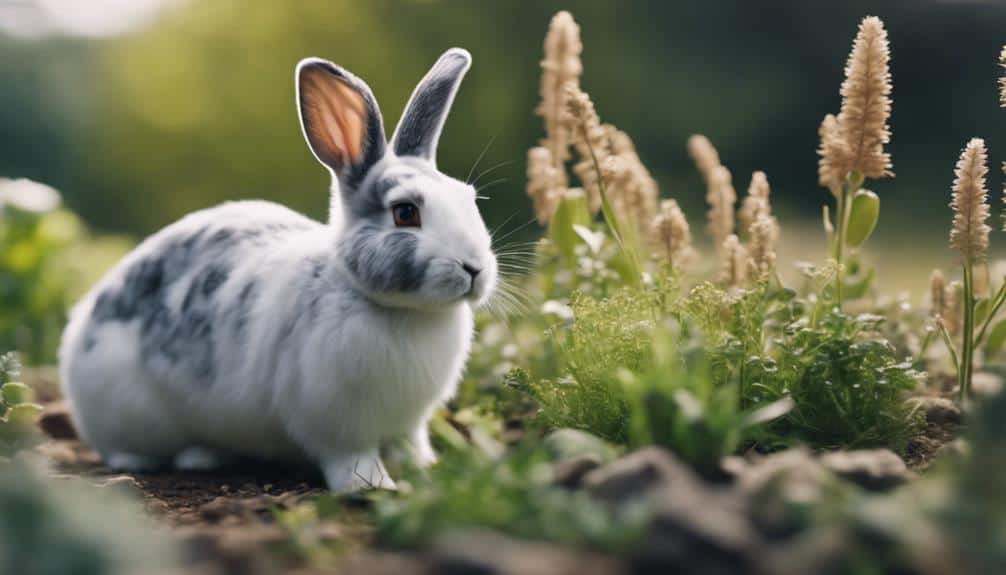
Rabbits help biodiversity by making bare soil patches where rare plants and insects can thrive. Their poop enriches the soil, helping plants grow and supporting many different species in the ecosystem.
Basically, rabbits create a diverse plant life that keeps the ecosystem healthy and balanced.
Biodiversity Support by Rabbits
Wild rabbits play a crucial role in maintaining ecosystem balance. They contribute to the environment by grazing and digging, creating space for unique plants and insects to flourish. This activity aids in the circulation of nutrients within the ecosystem, benefiting all its inhabitants. Rabbits help prevent any one species from becoming too dominant or disappearing entirely, thus preserving biodiversity. In fact, their impact on biodiversity surpasses that of livestock grazing. Protecting rabbit populations is vital for ecosystem health, habitat preservation, and overall environmental well-being. By fostering diversity, rabbits enhance the richness and complexity of ecosystems, making them more vibrant and engaging.
Ecosystem Balance Maintenance
European rabbits play a crucial role in maintaining ecosystem balance and biodiversity in the UK. They're like the VIPs of the animal kingdom, making sure everything is in harmony. By munching on plants and digging around, rabbits create cozy homes for rare plants and bugs, making the wildlife party more diverse. Plus, their digging adds important nutrients to the soil, keeping the whole ecosystem healthy and happy.
If rabbits were to disappear, many species could struggle to survive or even say goodbye forever. That's why it's super important to protect these fluffy creatures and make sure they stick around. Unlike cows or sheep chomping on grass, rabbits have a special touch that helps keep the ecosystem in check. So, let's give a big shoutout to these furry friends for all they do to keep our environment thriving!
Habitat Enhancement Through Rabbits
Improving habitats through the activities of these cute grazers is super important for promoting biodiversity and keeping ecosystems healthy. Rabbits help enhance habitats by creating bare soil when they munch on plants and dig around. This bare soil gives rare plants a chance to grow and supports all kinds of wild critters like bugs that need these conditions to thrive. Plus, the nutrients rabbits add to the soil with their grazing help plants grow even better, keeping the ecosystem in balance.
If we didn't have rabbits around, habitats could change a lot and we might see fewer plant types and species disappearing. That's why it's crucial to work on conserving rabbit populations to help preserve biodiversity. It's a win-win situation for rare plants and the overall health of habitats!
Rabbit Population Control in Ecosystems
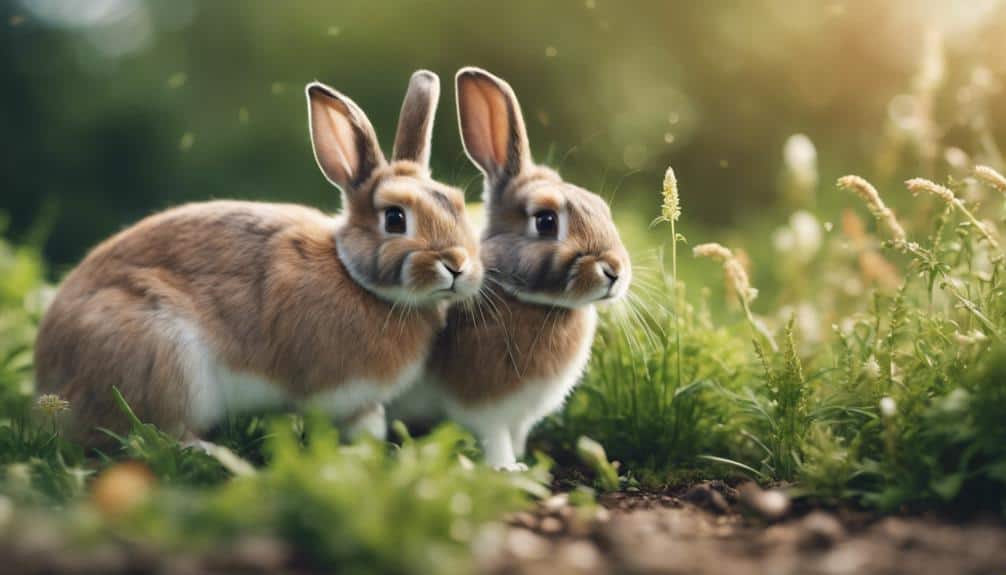
When it comes to managing ecosystems, it's really important to understand how rabbit population control plays a role in keeping things balanced and diverse.
Rabbits help out by munching on fast-growing weeds, which stops them from taking over and lets other plant species grow nicely.
They also serve as a tasty meal for predator species, which keeps the whole food chain in check and maintains a natural balance in the ecosystem.
Plus, rabbit poop is like nature's fertilizer! It's full of nutrients that help the soil stay healthy, which is great for plant growth and overall ecosystem wellness.
By being a snack for predators, rabbits help prevent their own population from getting out of control. This way, there's a good balance that keeps everything in check and stops any ecosystem problems from popping up.
Rabbit Habitats and Ecosystem Balance
Rabbits are super important for keeping our ecosystems healthy. They do a lot to help out! By munching on plants and digging around, they create space for new plants to grow and add nutrients to the soil. This helps all kinds of creatures, like bugs and other critters, thrive in their habitat.
Unlike big farm animals that can sometimes harm the land they graze on, rabbits actually help the environment. They make sure nutrients keep moving through the ecosystem and help everything stay in balance. Without rabbits around, lots of species could struggle or even disappear. That's why it's crucial to look out for rabbit populations and make sure they stick around. They do way more than just hop around – they're a key part of keeping our ecosystems happy and healthy.
Rabbit Contributions to Plant Diversity
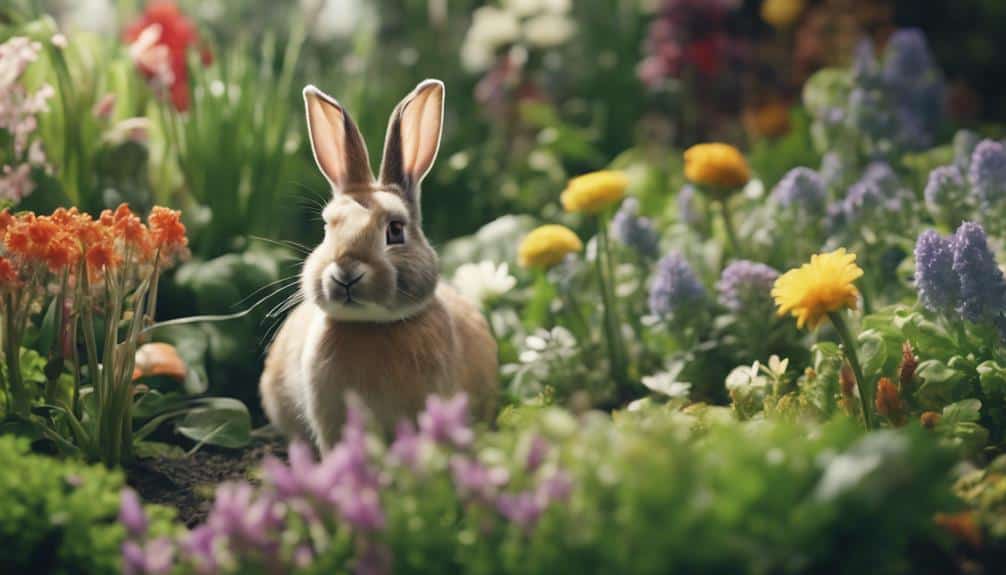
Rabbits help plant diversity by eating fast-growing weeds, which stops some plants from taking over the whole area. They pick and choose what they eat, which keeps a good mix of plants around and makes sure no one plant dominates.
Plus, their poop acts like natural fertilizer, which helps the soil and makes plants grow well. Overall, rabbits make the environment richer and more diverse by doing these things.
Plant Biodiversity Support
Rabbits are important for plant biodiversity because they create bare soil through their grazing and digging activities. This bare soil helps rare plants and invertebrates to grow, which is essential for nutrient cycling and ecosystem health.
By enriching the soil with nutrients, rabbits support a diverse plant community. They also help in maintaining open habitats where unique plant species like the prostrate perennial knawel and field wormwood can thrive.
Conservation efforts that focus on rabbit populations can make a big difference in preserving plant biodiversity and ensuring the ecological balance.
Ecosystem Balance Maintenance
Rabbits are important for keeping the ecosystem in check. They munch on different plants, which helps maintain a good balance and encourages a variety of plants to grow. Their digging creates patches of bare soil where rare plants and small critters can thrive, making the whole plant community more diverse.
Plus, when rabbits do their business, it acts like a natural fertilizer, giving the soil a nutrient boost that helps plants grow better. This whole cycle of nutrients moving through the ecosystem because of rabbits is key to keeping everything healthy and making sure all the plants have what they need to grow.
If we didn't have rabbits around, the whole ecosystem could get out of whack. Plant diversity might suffer, and the balance of the whole place could be thrown off. So, these little herbivores really do a big job in keeping plant life healthy and varied in their homes.
Importance of Rabbits for Environmental Well-Being
Rabbits are pretty awesome for the environment. They do a lot to keep things in balance and make sure ecosystems stay healthy.
First off, these little guys help out by keeping habitats in check. They eat plants, which stops certain ones from taking over and lets a bunch of different plants grow. This helps create a good mix of vegetation for all sorts of animals to thrive.
By munching on plants, rabbits also help promote biodiversity. This means they prevent one type of plant from dominating an area, which lets other plant species have a chance to grow. This variety of plants then supports a whole range of wildlife.
And here's a cool thing – when rabbits dig around, they're not just playing in the dirt. Their digging actually helps the soil. It makes the soil looser, so water can soak in better. Plus, it stirs up the nutrients in the soil, making it better for plants to grow.
Lastly, rabbits are part of the food chain. They're food for many predators, which helps keep animal populations in check. This prevents some animals from eating too much and messing up the balance of the whole ecosystem. So, rabbits play a vital role in keeping everything in harmony.
Frequently Asked Questions
How Do Rabbits Affect the Environment?
Rabbits are actually pretty important for the environment. They help prevent soil erosion, support biodiversity, control pests, cycle nutrients, restore habitats, impact grazing, disperse seeds, store carbon, produce fertilizer, and maintain wildlife balance. So yeah, they play a big role in keeping ecosystems healthy.
What Would Happen if Rabbits Went Extinct?
If rabbits were no longer around, we would see a decrease in biodiversity. This would affect animals that rely on rabbits as a food source, causing a ripple effect in the ecosystem. Without rabbits to keep their population in check, some plant species might become overgrown, which could lead to soil erosion. This would disrupt the balance of the food chain and make it easier for invasive species to take over.
The absence of rabbits would also have a big impact on agriculture. Farmers rely on these animals to help control the population of certain pests that eat crops. Without rabbits doing their part, farmers would have a harder time keeping these pests in check, potentially leading to lower crop yields.
Furthermore, rabbits play a role in disease control by keeping certain animal populations in check. Without them, there could be a rise in certain diseases that rabbits would normally help prevent from spreading.
What Is the Main Purpose of Rabbits?
Rabbits are super important in ecosystems. They help restore habitats, keep the soil healthy, control pests, support biodiversity, prevent erosion, spread plants, recycle nutrients, maintain wildlife balance, save water, and store carbon. Basically, they do a lot to keep the environment healthy and thriving.
How Do Wild Rabbits Help Save Ecosystems?
Wild rabbits are really good for the environment. They help make the soil healthier, increase the variety of plants, and keep nutrients moving around by munching on plants. Plus, they help control pests, keep a good mix of different plants and animals around, fix up habitats that need help, and make sure the ecosystem stays balanced.
Having wild rabbits around is super important for keeping the food chain going, storing carbon in the ground, and looking out for other wildlife that needs a safe place to live.
Conclusion
So, rabbits aren't just cute fluffy creatures bouncing around in fields. They actually help keep the environment in check and make sure things stay balanced.
Whether they're munching on grass or digging burrows, rabbits are doing their part to keep the soil healthy, increase plant variety, and maintain the overall stability of the ecosystem.
So, next time you spot a rabbit enjoying a snack, remember that they're not just adorable – they're important players in the big natural picture.


